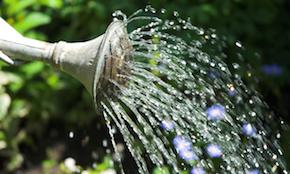“Ask the Plant and Pest Professor” is compiled from phone and email questions asked the Home and Garden Information Center (HGIC), part of University of Maryland Extension, an educational outreach of the University of Maryland.
Question #1: My three year old Concord grape vine has lots of brown spots on the leaves. The fruit is also turning black and wrinkly like a raisin. What should I do? Are there any natural products I can spray them with?
Answer #1: Most likely your grape vine is infected with black rot, a fungal disease. This is a very common disease problem on grapes. Unfortunately it is already too late to treat the disease this season. Right now sanitation is important. All the diseased grapes, including the grapes and leaves that have fallen to the ground should be disposed of. The disease will not kill the vine, but next season you will need to begin a spray program to prevent this from happening again. Prune the vine in the dormant season and spray using a registered fungicide as soon as new growth begins to develop next spring. Sulfur and Bordeaux mixture are the organic options. Spray to protect the foliage before a rain event.
Question #2: What can I use to kill insects in my lawn that is safe to use around pets and children?
Answer #2: Other than grub prevention, which we only recommend in cases where a lawn has a history of grub problems, we do not recommend applying an insecticide to control insects in lawns. Many, if not most, of the insects in your lawn are beneficial and contribute to the overall health of your lawn and the soil beneath it. For example, ants are predators of termites, helping to keep their population down. Tall fescue lawns have few insect problems that cause any significant damage. If you suspect you have an insect problem in your lawn call our gardening hotline or send a question to us through our website.
Question #3: I am a beginner vegetable gardener and have a pretty basic question. What is the best way to water a vegetable garden and how much water should I give my plants?
Answer #3: Vegetables planted in average well-drained soil require about an inch of water per week from rainfall or irrigation (equal to about 62 gallons of water per 100 square). Gardens in sandy soil will require a bit more than that in the height of the growing season. Water is crucial during seed germination, after planting transplants, and during flower and fruit production. Avoid overhead and frequent shallow watering which encourages plant diseases and a shallow root system. Soaker hoses and drip irrigation are the most efficient means of watering. They provide water right to the root system and minimize water usage. When using a hose, use a wand attachment so the water can be directed under the foliage directly to the roots. Water as early in the day as possible to allow the foliage to dry before evening. Add compost or other types of organic matter to increase the water holding capacity of the soil and mulch to conserve soil moisture.
To ask a home gardening or pest control question or for other help, go to https://extension.umd.edu/hgic Or phone HGIC at 1-800-342-2507, Monday through Friday, 8 a.m. to 1 p.m.



Write a Letter to the Editor on this Article
We encourage readers to offer their point of view on this article by submitting the following form. Editing is sometimes necessary and is done at the discretion of the editorial staff.